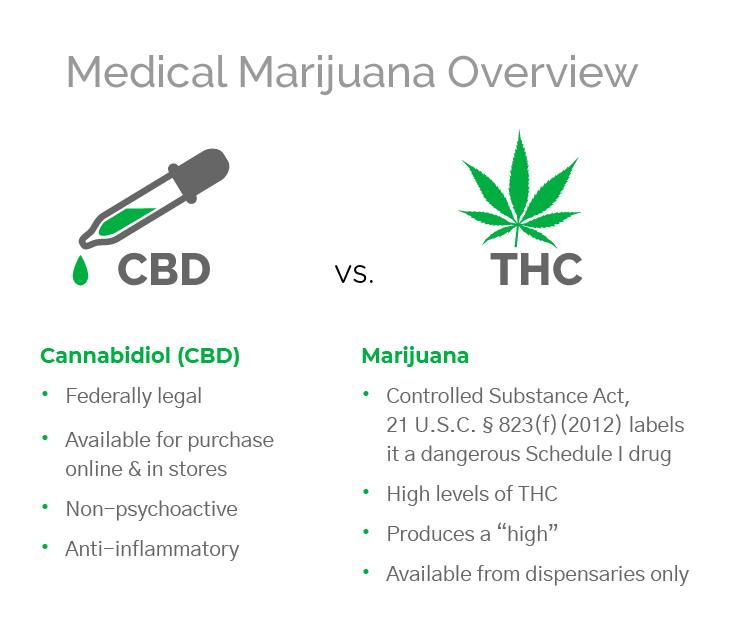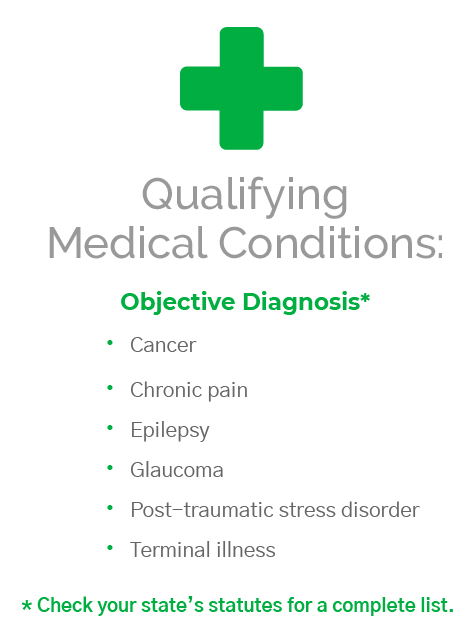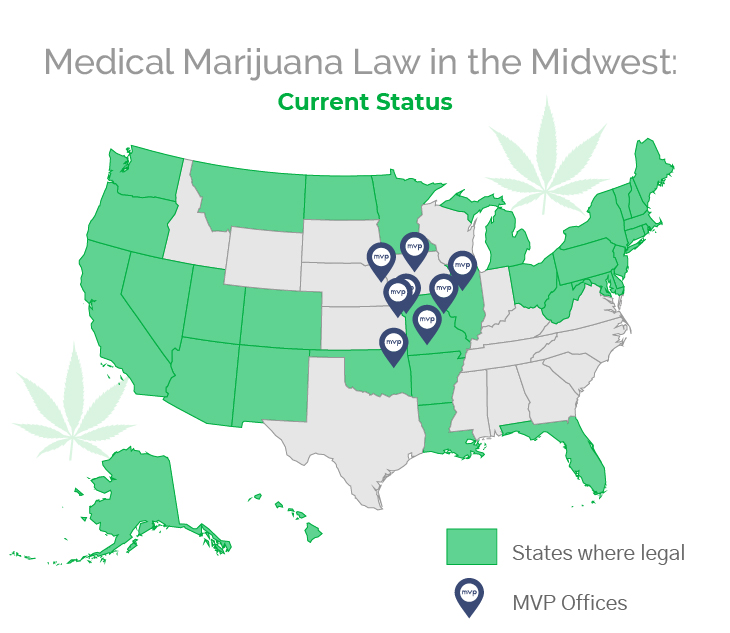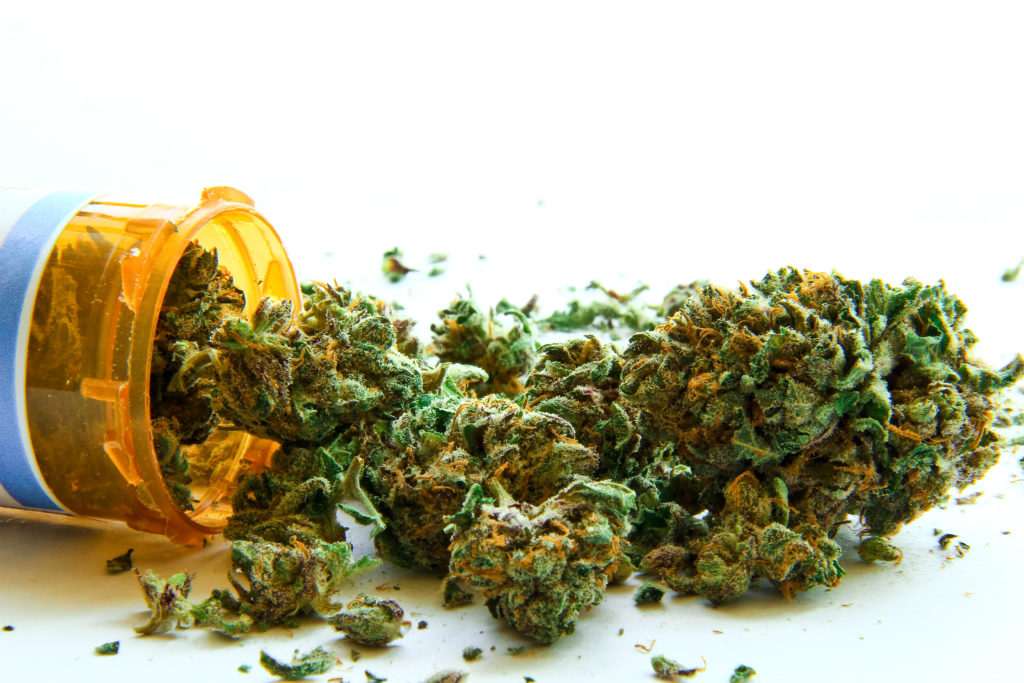Earlier this year Illinois Governor J.B. Pritzker made history when he signed into law a bill legalizing the possession and purchase of recreational marijuana for adults. With the stroke of a pen, he also created a series of legal questions for employers, not just in Illinois but also in neighboring states—especially those of us just across the state line in St. Louis.
Starting Jan. 1, 2020, Illinois residents will be able to legally purchase up to 30 grams of marijuana, and visitors to the state will be allowed to buy up to half that amount.
Considering the many Illinoisans who work in Missouri and vice versa, this legislation raises a number of interesting questions. For instance, what are the implications for employers when it comes to drug testing, employee discipline or workers’ compensation? The answers are usually, “It depends.”
Questions abound
These questions aren’t unique to Illinois and Missouri – nor are they limited to just recreational marijuana use. In fact, with medical marijuana legal in two-thirds of the 50 states, two things are clear:
- It’s the legal impacts of medical marijuana in the workplace that is at the fore of many employers’ and carriers’ minds.
- More Americans are using medical marijuana therapeutically than ever before.
And it appears this issue isn’t going away anytime soon. According to a recent Quinnipiac University poll, the overwhelming majority of Americans – 93% – support allowing adults to legally use medical marijuana with a doctor’s prescription.
Regardless of the marijuana laws in your state, there are proactive steps you can take now to protect your company down the road. But first, let’s address some of employers’ most common questions.
What is marijuana?
There are some key differences between cannabidiol, or CBD, which is legal and readily available nationwide, and marijuana, which is illegal at the federal level. As Dr. Peter Grinspoon describes in Harvard Health Blog, CBD is a component of medical marijuana extracted from the hemp plant.

Unlike marijuana, CBD doesn’t cause a “high” on its own, but research suggests it’s effective in helping reduce chronic pain, anxiety and insomnia. Its more controversial cousin, marijuana, includes the psychoactive chemical THC, which is derived from the dried flowers of the hemp plant. Labeled a dangerous Schedule I drug under the Controlled Substance Act, marijuana is available in some states with a doctor’s prescription to help manage terminal illness and PTSD, among other ailments.

What conditions qualify for medical marijuana?
The types of medical conditions eligible for medical marijuana prescriptions vary from state to state. However, debilitating illnesses, chronic pain and PTSD consistently appear as qualifying medical conditions across the U.S.
Is medical marijuana legal in my state?

Medical marijuana is currently legal in 33 states and the District of Columbia, with more states expected to follow suit or even decriminalize for recreational use.
Can employers still drug test employees?
Generally speaking, yes, so long as the testing is pursuant to an established and consistently enforced drug-free workplace plan. In certain circumstances, for example, CDL holders subject to DOT regulations, employers are required to conduct drug testing, including for marijuana. Aside from DOT-mandated testing, the specific drug testing and employment or disciplinary action against employees for positive marijuana tests depends on where your company and employees are located. In Missouri, for example, employee drug testing is still permissible; however, businesses must have established and consistently enforced drug testing policies and practices in place. In Illinois, employers may still conduct established and nondiscriminatory drug testing policies, but the use of positive marijuana drug tests to discipline employees is less settled if the employee shows no signs of impairment.
How can employers test for marijuana impairment vs. influence?
They can’t—at least not yet. An employee may test positive for having marijuana in their system – it lingers for 30 days or more – but may not actually be impaired at the time of the test. Employers must show impairment based upon behavior, odor, performance and other objective observations. In most states, including Missouri and Illinois, employers may prohibit employees from working under the influence, using marijuana while on call or within a day of scheduled work or on-call time.
Can employers discipline and/or terminate employees for testing positive for THC, regardless of impairment?
Maybe. While the law here varies from state to state, most states allow termination if it’s consistent with established, published and nondiscriminatory company policy, but an employer may have to consider whether an employee may use marijuana as a reasonable accommodation – particularly under state law. The National Safety Council calls on companies to implement very specific drug policies that are “supported by workplace procedures to reduce the chance of litigation. Drug policy and workplace procedures should be reviewed by a lawyer to ensure they comply with state laws. And, policy must be updated frequently to keep up with changing laws and attitudes.”

Is medical marijuana use considered a reasonable accommodation under the Americans with Disabilities Act (ADA) or state civil rights acts?
Marijuana is still illegal under federal law and with rare exception, the courts do not consider medical marijuana a reasonable accommodation under the ADA. To date, federal courts have almost always refused to consider medical marijuana a reasonable accommodation under the ADA as federal law classifies marijuana as a Schedule 1 Drug. On the other hand, under state civil rights acts such as the Missouri Human Rights Act, marijuana use may be a reasonable accommodation. It’s still too soon to tell, and this is a complex issue on which states are divided. What is becoming increasingly clear is that employees who test positive for marijuana at a workplace without a drug policy stand a higher chance of proving discrimination under the ADA than those at companies with a robust drug policy in place. Employers may prohibit the use of marijuana but should engage in the interactive process for employees who claim a disability for which they seek the off-duty use of marijuana and address each employee based upon the specific facts of the disability, position, duties, alternatives, and the like. An employer does not have to accept an employee’s proposed accommodation and may select any effective.
Under the Family and Medical Leave Act (FMLA), do employees have the right to use medical marijuana?
Nothing within FMLA would ensure an employee’s right to use medical marijuana during leave. The FMLA entitles eligible employees job-protected leave; it does not address accommodations. The use of marijuana while on leave – whether medicinal or recreational – will depend upon applicable state law and limits upon an employer’s regulation of off-duty conduct, so long as the employee did not return to work under the influence.
Can employees use medical marijuana to treat work accidents?
Yes, provided they have a legal, state-issued medical marijuana ID card. CDL holders and employees in other safety sensitive positions, however, may be restricted from returning to their duties for a period following such use. Requirements for obtaining such a card vary by state but generally involve having a physician confirm your condition as qualifying for medical marijuana followed by an application process and fee.

Are employees entitled to unemployment benefits if terminated for testing positive for either legal or illegal use of marijuana?
It depends on the state. In Illinois, employees receive benefits even if a positive test is from illegal marijuana use—that is, unless they were intoxicated on the job. If an employer in Missouri can produce the items listed below, the employee’s wage credits can be cancelled, and they won’t receive benefits:
- Test results from a federally registered lab listing levels in sample
- Medical Review Officer (MRO) report
- Chain of custody for sample
- Copy of company policy
- Signed acknowledgment that employee was aware of policy
How can employers proactively protect themselves?
As the laws surrounding medical marijuana continue to evolve, review some simple steps you can take immediately to shield yourself against marijuana-related claims:
- Adopt, disseminate and consistently enforce written drug-free workplace, drug use and/or drug testing policies.
- Revise employee handbooks, drug testing policies and procedures, policies accommodating disabilities and seek review from qualified legal counsel. According to the National Safety Council, employees are three times less likely to produce a positive test result if they know they will be tested.”
- Comply with DOT required testing procedures.
- Train managers to identify marijuana impairment.
- Train managers to identify requests for accommodation – remember, an employee does not have to use the words “disability” or “accommodation” to make a request under the ADA.
- Train managers how to conduct conversations regarding medical marijuana with employees and, when possible, refer requests for accommodation to Human Resources.
- Carefully consider medical marijuana-related accommodation requests before acting and engage in the interactive process with employees who request accommodation.
- Use qualified third-party testing, ideally SAMSHA certified agencies for drug testing and screening validly prescribed medications.
- Ensure a causal connection between any screening tool and job-relatedness, business necessity or workplace safety.
- Avoid disability-related inquiries or generalized statements about disabilities or employment actions regarding persons with a disability.
Medical marijuana is currently legal in 33 states plus the District of Columbia, and the landscape is changing rapidly. If you’re concerned about how medical marijuana legislation will impact your business, contact MVP Law today.
Stephen A. McManus is the managing shareholder of MVP’s St. Louis office. He also serves on both the firm’s Board of Directors and its Senior Management team for Business Development and Marketing. Steve focuses his practice on representing self-insured employers, third-party administrators and insurance carriers in the defense of workers’ compensation claims in Missouri and Illinois.
Disclaimer and warning: This information was published by McAnany, Van Cleave & Phillips, P.A., and is to be used only for general informational purposes and should not be construed as legal advice or legal opinion on any specific facts or circumstances. This is not inclusive of all exceptions and requirements which may apply to any individual claim. It is imperative to promptly obtain legal advice to determine the rights, obligations and options of a specific situation.







